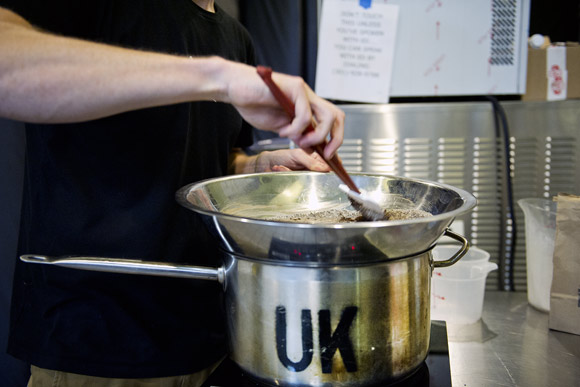Shedding its image as a destination for take-out-only transients, the local food scene has matured over the last decade into something distinctly D.C.
The District is becoming known as much for its food trucks as its five-stars, a place where the lunch hour has become more of a conversation starter than a pit stop and the latest hotspot could have literally popped up within the last week.
So how does a city that’s just stepping into its food identity grow its reputation as an eating destination? How do the new food concepts that grab headlines or turn heads also bring people together or revolutionize a neighborhood? And how can the city keep it going?
These are some of the topics up for discussion at a panel discussion taking place at 6 p.m. on June 20 at
Union Market. The public event is the second in a series hosted by
Smart Growth America and co-sponsored by Elevation DC about the intersection of place and the economy.
Panelists will host a conversation about how food is informed by where we eat it, how businesses are creatively considering uncharted eating spaces in the city and why these trends appeal to a generation looking to connect with others over a meal.
A new sense of community
Though D.C. has a long history of cultural food communities, residents are discovering a new sense of community around a variety of tables, happy hours, street corners and homes.
Some of these shared food experiences have happened organically as more people talk about and connect over what they’re eating. Others are the result of businesses recognizing that they’re selling not only food but also a sense of place — even if their food is coming from a place on wheels.
“I don’t think that it has to happen organically,” says Wendy Stuart, co-founder of the consulting firm
Food Works Group and a trained chef. “Food is not the center of culture here as it is in most places in the world," but with curated food destinations like Union Market, "people are choosing that it become the center.”
Though the District’s dining scene was blooming, Noah Karesh found too many restaurants sterile and impersonal. His response: launching the online marketplace
Feastly, which connects D.C. eaters to cooks opening up their homes for meals.
�Food is not the center of culture here as it is in most places in the world, [but] people are choosing that it become the center.�
“I think we’ve shown that there’s a huge need for creating more spaces for people to create community” over food, says Karesh.
He’s also one of the people taking advantage of empty spaces to create more food centers and communities. Why wait to establish a formal restaurant when there are underused spaces in the city?
Karesh is a co-owner of
The Blind Dog Cafe, a pop-up coffee shop near U Street that uses by day what is
Darnell’s Bar at night. Along with daytime coffee shops, the city’s pop-up concept has expanded to include bakeries within eateries or high-profile chefs trying out new concepts in temporary spaces.
So why is D.C. so enamored with the concept? For one, it’s unpredictable and gives participants that feeling that they’re part of something, that they’ve discovered something new, says
Beth Kanter, author of several books about navigating DC’s
restaurant and
chef scenes.
Take
Pleasant Pops, a popsicle business that started at a farmers market, graduated to a food truck and then used a
Kickstarter to open a new café on U Street. The place is one of Kanter’s favorite examples of how mobile food centers provide a safe harbor for business experiments while fostering a sense of community among customers.
“I think people feel very proud and attached to the people that they’ve been following who go out and do something with the help of customers and the community,” says Kanter.
She says participating with producers in these non-traditional spaces “takes you out of your cube mentality experience.”
The swarms of people around D.C.’s food trucks are Exhibit A of the city’s changing attitudes toward mobile eating.
Although the industry has faced its share of regulatory hurdles, it has also helped loosen up and define D.C.’s new dining character.

Facilities like Union Kitchen in Northeast Washington have taken the initiative to provide space to an industry that often needs it to grow. Its 7,300-square-foot warehouse near Union Station provides incubator and commercial kitchen space to budding food businesses. The facility adds some local culture to the mix by hosting events and artists in the space as well.
But even as the variety of eating options has expanded, parts of the city still struggle to find access to food that is healthful and affordable, let alone trendy.
Sharon Feuer Gruber, nutrition initiative adviser at the city’s largest food pantry,
Bread for the City, says there is still plenty of work to be done.
“What I see more is how lack of food affects place,” says Feuer Gruber, whose organization hosts a free monthly farmers market in Southeast.
She said lines for the market start forming a couple hours before it opens — and it’s there she sees glimpses of community forming.
“When I think about what could be Southeast…” Feuer Gruber says, looking for a good place to start, “Among other things, I hope that more food trucks go there, because people want it. They could do well.”
Registration for Food in the City will open soon. Sign up for our newsletter to make sure you don't miss a chance to attend this free event.